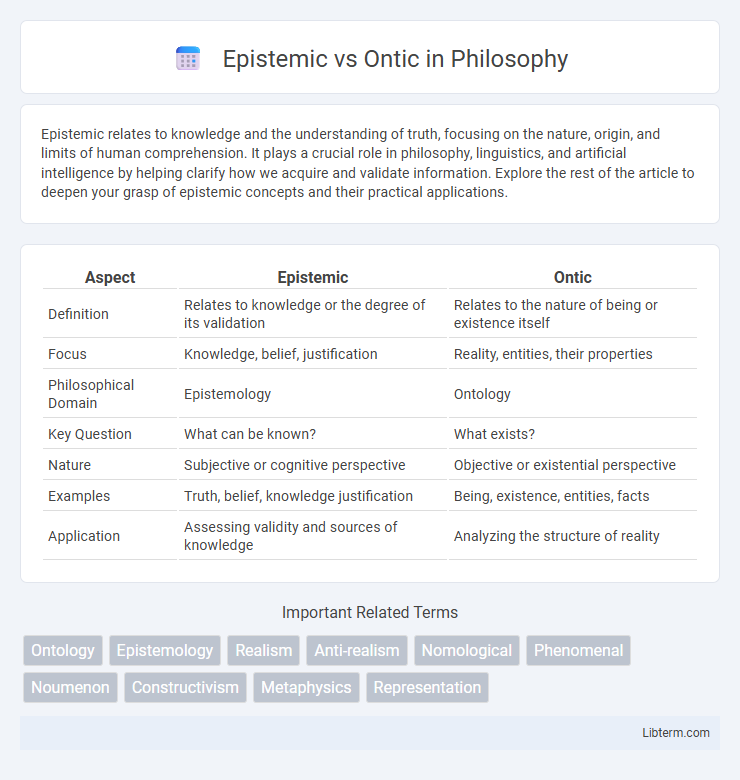Epistemic relates to knowledge and the understanding of truth, focusing on the nature, origin, and limits of human comprehension. It plays a crucial role in philosophy, linguistics, and artificial intelligence by helping clarify how we acquire and validate information. Explore the rest of the article to deepen your grasp of epistemic concepts and their practical applications.
Table of Comparison
| Aspect | Epistemic | Ontic |
|---|---|---|
| Definition | Relates to knowledge or the degree of its validation | Relates to the nature of being or existence itself |
| Focus | Knowledge, belief, justification | Reality, entities, their properties |
| Philosophical Domain | Epistemology | Ontology |
| Key Question | What can be known? | What exists? |
| Nature | Subjective or cognitive perspective | Objective or existential perspective |
| Examples | Truth, belief, knowledge justification | Being, existence, entities, facts |
| Application | Assessing validity and sources of knowledge | Analyzing the structure of reality |
Introduction to Epistemic and Ontic
Epistemic relates to knowledge, belief, and the conditions of knowing, focusing on how we understand and justify information. Ontic concerns the nature of being and existence, dealing with what entities or realities fundamentally are. Distinguishing epistemic from ontic provides clarity in philosophy by separating issues of knowledge from those of existence.
Defining Epistemic: Understanding Knowledge
Epistemic pertains to the nature and scope of knowledge, focusing on how beliefs are justified and how information is acquired and validated. It explores the processes involved in knowing, including perception, reasoning, and evidence assessment, emphasizing cognitive frameworks and epistemological principles. Defining epistemic involves examining the mechanisms by which knowledge claims are evaluated and the criteria used to determine truth and belief reliability.
Defining Ontic: Understanding Reality
Ontic refers to the study of realities that exist independently of human perception, emphasizing actual entities and facts as they are in themselves. It involves exploring the nature and properties of being, focusing on tangible and objective existence rather than knowledge or beliefs about it. Defining ontic entails grasping the essence of reality as it stands, beyond epistemic interpretations or subjective understanding.
Key Differences Between Epistemic and Ontic
Epistemic relates to knowledge, beliefs, and the process of understanding, emphasizing how individuals perceive and interpret reality. Ontic pertains to the nature of being and existence itself, focusing on what entities exist independently of perception. The key difference lies in epistemic addressing the subjective framework of knowledge acquisition, while ontic concerns the objective status of what is real.
Epistemic Perspectives in Philosophy
Epistemic perspectives in philosophy emphasize the nature, scope, and limits of knowledge, focusing on how beliefs are justified and how truth can be known. They explore concepts such as epistemic justification, certainty, and the conditions under which knowledge claims can be considered reliable or warranted. This approach contrasts with ontic perspectives by prioritizing cognitive processes and epistemic agents' access to truth rather than the objective existence of reality itself.
Ontic Perspectives in Philosophy
Ontic perspectives in philosophy emphasize the nature of being and existence as objective realities independent of human thought or perception. This approach investigates the actual entities, structures, and states that constitute reality, focusing on what is fundamentally present rather than how knowledge about it is acquired or constructed. Ontic analysis explores the essence and properties of things as they exist in themselves, providing a foundational framework for metaphysics and the study of objective truths.
Applications in Science and Metaphysics
Epistemic perspectives in science prioritize knowledge, observation, and the limits of what can be known, aiding in hypothesis testing and model validation. Ontic approaches address the nature of being and existence, grounding metaphysical inquiries into what fundamentally constitutes reality. Integrating epistemic and ontic frameworks enhances scientific theories by clarifying both empirical understanding and the underlying essence of phenomena.
Common Misconceptions Explained
Epistemic relates to knowledge and belief about reality, while ontic refers to the nature of being or existence itself. A common misconception is confusing epistemic uncertainty, which stems from limited knowledge, with ontic uncertainty, which arises from inherent randomness in the world. Clarifying this distinction improves understanding in fields like philosophy, physics, and artificial intelligence, where epistemic states shape theories but ontic states define objective reality.
Epistemic vs Ontic in Quantum Mechanics
Epistemic and ontic interpretations in quantum mechanics distinguish between knowledge-based and reality-based understandings of quantum states. Epistemic views treat the quantum state as a representation of an observer's information about a system, emphasizing uncertainty and measurement outcomes. Ontic perspectives assert that the quantum state corresponds to an element of physical reality, independent of observation, grounding phenomena such as wavefunction collapse and entanglement in objective existence.
Conclusion: Implications for Understanding Reality
Distinguishing between epistemic and ontic perspectives shapes how reality is conceptualized, where epistemic relates to knowledge and belief systems while ontic concerns the nature of being itself. Recognizing this distinction clarifies debates in metaphysics and influences scientific modeling by identifying whether statements reflect subjective understanding or objective existence. This foundational differentiation impacts philosophical inquiry, informing theories of truth, perception, and the limits of human cognition.
Epistemic Infographic

 libterm.com
libterm.com